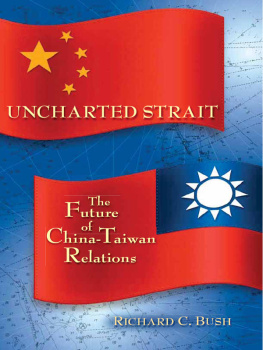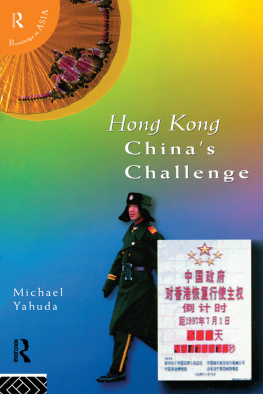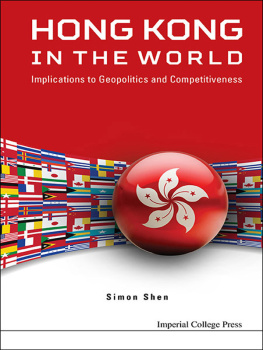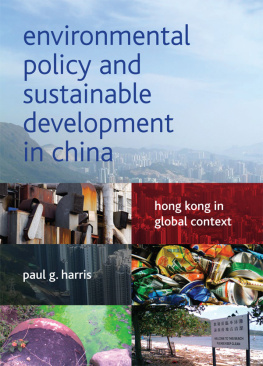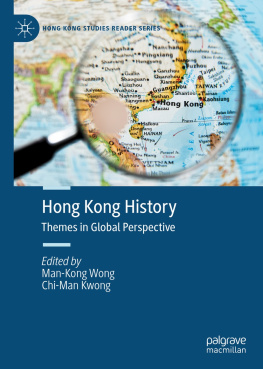HONG KONG IN THE SHADOW OF CHINA
Living with the Leviathan
RICHARD C. BUSH
BROOKINGS INSTITUTION PRESS
Washington, D.C .
Copyright 2016
THE BROOKINGS INSTITUTION
1775 Massachusetts Avenue, N.W., Washington, D.C. 20036
www.brookings.edu
All rights reserved. No part of this publication may be reproduced or transmitted in any form or by any means without permission in writing from the Brookings Institution Press.
The Brookings Institution is a private nonprofit organization devoted to research, education, and publication on important issues of domestic and foreign policy. Its principal purpose is to bring the highest quality independent research and analysis to bear on current and emerging policy problems. Interpretations or conclusions in Brookings publications should be understood to be solely those of the authors.
Library of Congress Cataloging-in-Publication data
Names: Bush, Richard C., 1947 author.
Title: Hong Kong in the shadow of China : living with the Leviathan / Richard C. Bush.
Description: Washington, D.C. : Brookings Institution Press, 2016. | Includes bibliographical references and index.
Identifiers: LCCN 2016017498 (print) | LCCN 2016028869 (ebook) | ISBN 9780815728122 (paperback : alk. paper) | ISBN 9780815728139 (epub) | ISBN 9780815728146 (pdf)
Subjects: LCSH: Hong Kong (China)Politics and government1997 | DemocratizationChinaHong Kong. | Business and politicsChinaHong Kong. | Political participationChinaHong Kong. | Political CultureChinaHong Kong. | BISAC: POLITICAL SCIENCE / Political Ideologies / Communism & Socialism. | POLITICAL SCIENCE / Political Process / Elections.
Classification: LCC JQ1539.5.A91 B87 2016 (print) | LCC JQ1539.5.A91 (ebook) | DDC 320.95125dc23
LC record available at https://lccn.loc.gov/2016017498
9 8 7 6 5 4 3 2 1
Typeset in Garamond Premier Pro
Composition by Westchester Publishing Services
For my siblings
Nancy Ellen Bush Frenkel
Susan Thompson
Paul Harris Bush
Contents
Acknowledgments
In most cases, the acknowledgments section of a book recognizes people and institutions only. In this case I feel obliged to acknowledge my debt to a placeHong Kong. My family lived there from 1960 to 1965 (my parents were missionaries), which were my years for secondary school. Because I went to a British school with a very British curriculum, I learned nothing about China in my classes. But more than any other reason, the experience of living in a Chinese society for five formative years led me to devote my professional career to the study of China. Without my Hong Kong experience, I am sure that my life would be very different and probably a lot less interesting. So I owe Hong Kong a lot, and this book is but a small and partial repayment of the debt I owe.
But there are others to whom I am indebted as well. First of all are the donors who have made this book possible: the generous individuals in Taiwan and elsewhere who made donations to the Chen-fu and Cecilia Yen Koo Chair in Taiwan Studies, which I hold, the Smith Richardson Foundation, and the Taiwan Semiconductor Manufacturing Corporation (TSMC) Education and Cultural Foundation. I am grateful to Allan Song at Smith Richardson and Morris Chang at the TSMC Education and Cultural Foundation for their sustained encouragement of my work.
Colleagues at Brookings have been unstintingly supportive. Strobe Talbott has set a shining example of how to combine administration and scholarship. Martin Indyk and Bruce Jones, the previous and current directors of Brookings Foreign Policy Program, have given me strong encouragement for this project, as have colleagues in the John L. Thornton China Center. In particular, I have drawn on the many conversations Jeff Bader and I had over the years about Hong Kong and how the U.S. government should and should not attempt to promote democracy overseas. My staff and colleagues in the Center for East Asia Policy Studies have been consistently supportive. Of that group, my greatest appreciation goes to Maeve Whelan-Wuest, my research assistant since early 2015. She has assisted me in countless ways: relentlessly searching for the data I needed to make my analytical points, combing through each draft of each chapter with a fine-toothed comb, and generally making it easy to stay in the zone of thinking and writing. Michael OHanlon, Stephen Young, former U.S. Consul-General in Hong Kong, and an anonymous specialist reviewed the manuscript and made many good suggestions (I alone am responsible for the mistakes that surely remain).
Many other friends and colleagues have made invaluable contributions to my understanding of Hong Kongs past, present, and future. Hong Kong has an outstanding group of scholars who have done exceptional work on an array of relevant issues, but regrettably much of that work is unknown and unrecognized in the West. Those Hong Kong scholars who have had the greatest impact on my thinking include: John P. Burns, Jean-Pierre Cabestan, Johannes Chan, Joseph Y. S. Cheng, Anthony B. L. Cheung, Michael C. Davis, Brian C. H. Fong, Leo F. Goodstadt, Richard Weixing Hu, Lau Siu-kai, Christine Loh, Percy Luen-tim Lui, Sonny Shiu Hing Lo, Ma Ngok, Suzanne Pepper, Ian Scott, Alvin Y. So, Yue Chim Richard Wong, Wilson Wong, Ray Yep, Rikkie Yeung, and Simon N. M. Young. I have also had the good fortune of enjoying the friendship and counsel of the individuals from Hong Kong who were Brookings visiting fellows from 2002 to 2015: Nelson Cheng, Richard Hu, Francis Leung, Simon Shen, Injoo Sohn, James Tang, Wilson Wong, Ray Yep, Chris Yeung, Rikkie Yeung, Zheng Hao, and Zhu Wenhui. Many others in Hong Kong, too numerous to name, opened their doors and their minds to me, and I am very grateful for their kindness. Officials at the U.S. Consulate General and in the Hong Kong Special Administrative Region government were always gracious in illuminating key issues. Other current and former Hong Kong hands who have been generous with their time and friendship include George Chen, Frank Ching, Michael DeGolyer, Steve Yui-sang Tsang, Richard Vuylsteke, Anna Wu, and Ted Zimmerman. Yun-han Chu, Larry Diamond, and Andrew Nathan have long been my gurus on democratization (and other subjects).
Sadly, two individuals who contributed a lot to American policy toward and understanding of Hong Kong will not have an opportunity to read my book. Congressman Stephen J. Solarz, who was my former boss, died in 2010. Nancy Bernkopf Tucker, a good friend and professor at Georgetown University, passed away in 2012.
As always, the members of my extended family have been immensely supportive. I dedicate this volume to my sisters and brother. It was in Hong Kong that we were last together before scattering to the four winds.
Note on Romanization
The Romanization of Chinese names is often an unstandardized jumble, especially for people connected with Hong Kong. Individuals who moved to Hong Kong in the last thirty years from the rest of the Peoples Republic of China generally use the pinyin system that is tied to standard Chinese ( Putonghua , or Mandarin in the West). Chinese who came to Hong Kong in earlier periods or were born in the city are mostly Cantonese, that is, they come from the province of Guangdong, which borders Hong Kong to the north. The Romanization of their names reflects their Cantonese origin and native dialect, which is mutually unintelligible from Putonghua . There are a couple of systems for Romanizing Cantonese names, and individuals are also free to exercise their individuality in how they spell their names. To make things more complicated, many people in Hong Kong also have an English-language given name, and their names are rendered in different ways in different contexts. For example, the name of Richard Wong Yue-chim, a professor of political economy at the University of Hong Kong, is sometimes rendered that way. But it also appears just as Richard Wong or as Yue Chim Richard Wong. For purposes of documentation, in cases like this I use the form used in the original source. Finally, Hong Kong, Chiang Kai-shek, and Sun Yat-sen are rendered in their conventional way even though that is inconsistent with the Romanization systems based on standard Chinese.
Next page

